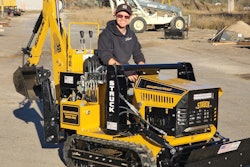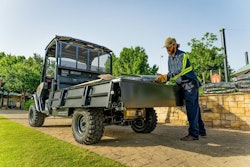G. Scott Edwards runs his construction company from the same building in rural Pennsylvania where his great-grandfather operated a general store in the late 1800s. His family ran an International Harvester farm machinery franchise at the site for 70 years, and Edwards grew up at the store, watching his father’s mechanics repair equipment.
When Edwards’ family sold the International Harvester franchise in 1986 after farming declined in the Bloomsburg area, it was only a matter of time before Edwards would start his own company.
“Growing up in a family business, I’d never been comfortable working for somebody else,” he says.
Edwards spent almost 10 years selling heavy construction equipment for several companies before founding G.S. Edwards, Inc., in 1996. That year one of Edwards’ customers was selling his entire fleet of machines. “He made the comment, ‘why don’t you just buy them all?'” Edwards remembers.
He did and moved the company to the old general store building in Orangeville that had been rented out since the departure of the International Harvester business.
Eighty percent of G.S. Edwards’ contracts are commercial site development jobs. The company also does some residential site work, builds logging roads, small bridges and dams, performs demolition work occasionally and restores streams – Edwards’ favorite type of project.
Edwards didn’t know much about running a construction company when he first started out, but learned a lot from the man who sold him his equipment fleet. The company quickly established a relationship with Geisinger Medical Center, which has several hospitals and clinics in the area. G.S. Edwards does site work for the medical center on a fairly regular basis. In addition, one of the company’s recent projects was site work for a new cell block at a state prison.
When he first started his business, Edwards says he worried about having enough work. He attributes his company’s growth to working diligently and following through on commitments. “My philosophy is that you go to work every day, treat your customers the way you want to be treated, and that’s 50 percent of the battle,” Edwards says. “If you don’t do it right, make it right.”
After its first year in business, G.S. Edwards had an annual volume of $210,000. Today the company is working on its third project worth more than $500,000.
Edwards usually works within a 60-mile radius of his office. While the office is located in a rural area, it’s only 40 miles from Harrisburg or Wilkes-Barre and 10 miles from Bloomsburg. Edwards says Bloomsburg is a hub for excavation contractors, making the bidding process very competitive. G.S. Edwards’ next major purchase will be some type of bidding software to give the company an extra edge over the competition, says Edwards’ wife, Karen, who works in the company’s office full time while also running her own accounting business.
Edwards has 10 employees in the summer and eight the rest of the year. He says finding skilled workers and keeping them long term is one of the biggest challenges facing small contractors. He began offering health insurance to his workers two years ago to help attract and retain key employees.
Cash flow can also be a problem for contractors who do site work, Edwards says. “We’re the first ones in and the last ones out,” he says. If there’s a delay somewhere in the middle, the excavation contractor can’t finish his work.
Other projects such as demolition, building logging roads and stream restoration help out with cash flow, Edwards says. The company demolished part of an old gym at Bloomsburg University to make way for classrooms. The project was difficult because half the structure had to remain standing. Some of the work had to be done by hand. The company also gutted a library on the campus that was then turned into a student union building.
“It’s neat to tear stuff apart,” Edwards says. “Every boy’s dream is to get on a bulldozer and drive through a building.”
Stream restoration is necessary in eastern Pennsylvania because the area is prone to flooding and soil erosion is a problem in the tributaries to the Susquehanna River. This work involves positioning rocks inside the stream to keep the current from hitting the banks. It also keeps sediment from building up in the middle of the riverbed, causing the stream to widen. Edwards uses an excavator with a thumb to place the boulders.
Edwards’ equipment acquisition strategy focuses on buying nearly-new used machines so he doesn’t have to absorb the initial depreciation. After years of selling heavy equipment, Edwards says: “I know equipment values. I know what things are worth. I can buy a machine at a price that if I wanted to sell it, I could sell it at about the same price.”
Edwards owns 12 pieces of equipment – including excavators, skid steers, bulldozers and compactors – and eight trucks. He rents equipment only when he needs a machine temporarily.
Edwards says he sees his company growing in the future, but wants the growth to be slow. He’d like to do more prime contractor work and find a niche. “If I wanted more employees, more equipment, I could probably get them,” he says. “But I’m very cautious. I like cautious, slow growth.”
Edwards has a nephew who is in college and a 17-year-old son who both work for the company part time. “The future also depends on the next generation,” he says.






